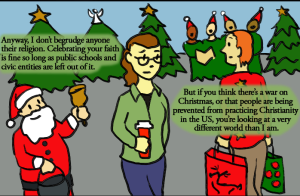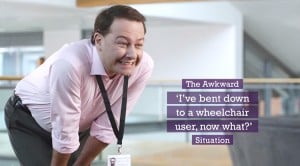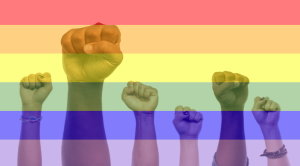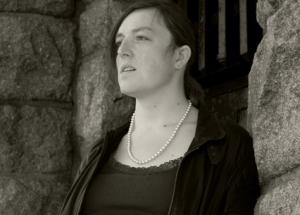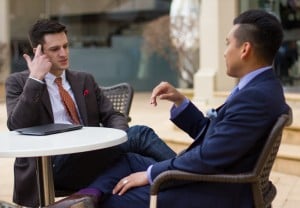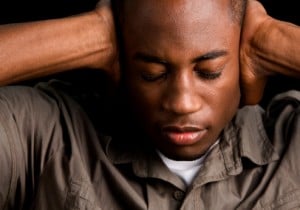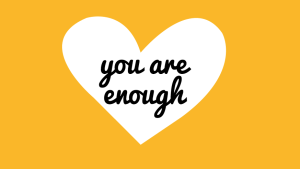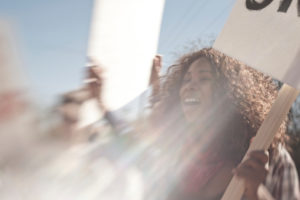
Person holding a sign protesting in a crowd
Two weeks after my birthday, I remember sending out text messages to close friends about my whereabouts as I was getting ready to protest Hillary Clinton.
It was Oct. 30th, 2015 and I — along with eight other AUC Shut It Down student organizers — planned to interrupt Hillary Clinton as she spoke to Black HBCU students at Clark Atlanta University.
AUC Shut It Down is a student organization focused on Black liberation and community organizing based out of the Atlanta University Center consisting of Spelman, Morehouse and Clark Atlanta University. We had only been around for a year before this direct action and were all a bit on edge of the results of taking a stance this big.
We were removed by the secret service and faced extreme backlash and student disapproval for our actions. That was my first time participating in a direct action.
The backlash and vitriol stemming from that action led me to realize I had no idea how to take care of myself in the wake of trauma.
I was so obsessed with Twitter — organizing responses and community-building — that I didn’t eat. I missed class, I lost friends, and I truly let myself fall down a hole that took awhile to get out of.
The funny part is: I felt fine. I thought that sacrifice was part of the work. Exhaustion, anxiety, and stress just seemed to be what organizing was. I thought I was supposed to be tired.
I knew that wins were possible. I had studied The Black Panthers and seen some of the ways that local organizers had created tangible change. I knew, if I stayed with the work, wins would eventually happen.
I looked past the hardship of movement work because I wanted to be a part of the change. I could see myself and fellow organizers falling apart as we all stayed the path in the name of the movement.
In many organizing spaces, self-care felt like a last ditch effort for those on their last leg needing a few days away from the work.
It felt like a burden to have to explain to folks that I, in fact, would NOT be attending the 3-hour conference call about strategy because I realized I hadn’t eaten that day.
For many student organizers, the work to create and strategize around social justice issues involves emotional and physical labor that takes a toll on our spirit, body, and mind.
I am writing this as a love letter to myself two years ago. I am writing to the girl who was failing classes and not eating; the one who was so enthralled in work that self-care meant taking a nap between classes.
I hope this article will serve to encourage young folks doing organizing work who see themselves falling apart and need some first steps to a healthier work balance.
So here is my advice:
1. Set Strong Boundaries.
I remember always being ready to jump on a call, or organize a direct action, or spend hours in an office strategizing — even if it cut into my school work or took a toll on my health.
As student organizers, it may seem difficult to not take the lead on a social justice project, but the goal is to realize “No” is a complete sentence.
“No” means choosing to take care of yourself. There will always be opportunities to engage in the work another time.
Telling folks very clearly what you will and won’t participate in is a good starting point. Clear boundaries can help to avoid burnout and present new, more holistic ways to love and care for ourselves.
This might just mean turning your phone on DND (Do Not Disturb) at certain hours or speaking with your professors about your circumstances and finding ways to get help.
2. Distance yourself from Social Media
Social media can be a great tool to network and mobilize across the globe. But it can also be a toxic place that makes us feel isolated, critiqued, and can cause anxiety.
It is important to find ways to limit your social media consumption. I promise you, you will not miss anything. You do not need to respond to every troll.
Set boundaries on who you follow, block anyone causing you harm, and celebrate folks who celebrate you.
It is your social media and you control what you engage with. Delete apps that cause you stress and add them back if and when you’re ready.
Doing this social media cleanse can help you to conserve energy while keeping your timelines streamlined and specific to what you want to focus on.
3. Acknowledge Your Feelings
The first time I genuinely felt free was after protesting Hillary Clinton. However, after losing friends and important relationships I realized I had no bearing on how to deal with these losses in an effective way.
In the aftermath of the Hillary protest, I began to lose friends who felt as if the direct action wasn’t effective or made Black people look bad. I just had to have very frank conversations about how I felt and I realized I was never going get the closure I needed from those people.
As student organizers, it’s vital that we recognize these common feelings of loss and trauma and find a way to heal effectively. If we bottle up and don’t acknowledge our emotions, it’s easy to start projecting bottled emotions onto others.
4. Learn How To Journal and Meditate
I grew up feeling as if relaxation was for folks who had money, time and leisure. As a Black woman from a low-income household in Charlotte, NC, nothing about my life led me to ever feel comfortable.
I was taught to have a constant anxiety around being poor, being seen as lazy or not hard working, or being considered ungrateful.
This mentality around energy led me to give my all to school, work, and social climates. This led me to exhaustion and, the semester after the Hillary interruption, a depression diagnosis.
I started exercising, doing yoga, and learning about meditation as a practical first step to getting my anxiety under control. I had previously felt like yoga was for white folks with money but I found a niche of Black femme yoga instructors who made yoga more realistic and reasonable.
Find great Black yogis creating cool content around meditation, yoga, and therapy.
5. Connect With Faculty That Are Supportive
One of the beauties of a college campus is that there are folks who can help you when you can’t help yourself. There were times when I missed classes or wasn’t spiritually present in class and professors reached out and were willing to work with me on assignment deadlines.
I’ve noticed that a lot of Social Science Professors are more understanding of the work student organizers do BUT that doesn’t mean you won’t have allies in other departments.
It’s important to build strong relationships with any professor, but if you know you need more time or need modifications, speak to your professors and see what they can do for you.
6. Check Out Your School’s Counseling Services
I know this varies based on your school and what type of staff is available, but try to schedule an introductory appointment to see if counseling services are a feasible option for you.
I know counseling didn’t work for me because, at the time, I wasn’t making it a priority. But, check in with yourself to decide if therapy is something you can sustain.
7. Create a Self Love Mantra
I’m not going to lie, the first two weeks I read out my mantra I felt silly. I was just speaking to myself out loud and it felt useless.
But, creating a self-love mantra is important. It can be anything, but, ideally, this one-to-two sentence statement should be a spiritual goal or observation about yourself that you hope to develop or explore over time.
Your mantra should be a self-love affirmation that can be repeated every day and you should try to repeat it every morning, if possible. After some time, you may not fully believe it but you should know the mantra so well that you are always looking to achieve it.
***
My goal in using my own trials and challenges with self-care as a student activist is to debunk the idea that you should feel guilty for taking care of yourself. The systems we fight want us to work ourselves to death so that the work we do becomes unsustainable.
But, if we let this capitalist structure break us down then that means we have let the work consume us.
The best thing we can do for ourselves is to recharge and realign ourselves so we can get back into our work more focused than ever.
[do_widget id=’text-101′]
Clarissa Brooks is an Everyday Feminism Reporting Fellow. Clarissa is a senior at Spelman College, a journalist, and a community organizer. Originally from Charlotte, NC, Clarissa works to blend her love of community, ethical journalism and scholarship in a way that will create a better world. Clarissa has been an ONA HBCU Fellow, Equality For Her Intern and Summer Fellow for Students For Education Reform. Clarissa has been engaged in community organizing work and journalism for nearly 3 years.From mobilizing communities, hosting teach-ins, leading direct actions, and developing policy her love of community always comes first.
Search our 3000+ articles!
Read our articles about:
Our online racial justice training
Used by hundreds of universities, non-profits, and businesses.
Click to learn more
Most Read Articles
- « Previous
- 1
- …
- 30
- 31
- 32






